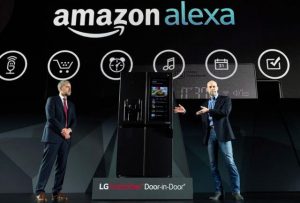Google bought Nest at a high price of $3.2 billion in 2014 and strongly announced its entry into the IoT market, not to mention Google’s prospects in the Internet of Things, but from now on, at least we have been able to judge that this acquisition is indeed Google's big failure; Lei Feng.com found on the CES 2017 that Amazon's Alexa has become the voice assistant of choice for many smart hardware companies. If voice will become the entrance of all IoT devices, then Amazon has already gone to Apple, Google and Microsoft and other fronts; CB Insights recently released the AI ​​Enterprise Top 100 list. It is gratifying that there are four IoT companies in this list, which is worthy of consideration by practitioners in the entire industry.

In 2014, Google realized that they missed the IoT ticket, but considering the value of future family data, they ended up spending $3.2 billion to buy Nest.
Only this transaction seems to be running badly.
A large part of Nest's value is that Google feels they can recreate a single item IoT gateway (IoT hub, which supports various IoT protocols, named Flintstone) according to the thermostat standard, and is equally popular.
For now, this gambling is undoubtedly bad. When Nest released Flintstone is still unknown, and the only hardware product released in the past two years was Dropcam ($555 million) acquired at an excessive price.
The internal chaos that came out in March this year also revealed some problems and a brief description:
The cultures of the two teams at Dropcam and Nest are vastly different and run poorly. With the 100 employees coming in through the merger, almost half have gone.
Nest's CEO, Tony Fadell, seems to have a "Jobs syndrome" that is very authoritarian in product and business and has little room for negotiation. The CEO of Dropcam recently called Fadell a "tyrant." In addition, most of Nest's employees have cashed in Google/Alphabet stock and are leaving.
The trust between Alphabet and Nest doesn't look very good. The best evidence is that Google itself released the IoT gateway OnHub to replace Flintstone, which is always waiting.

Microsoft dominated the PC era, and Google and Apple are vying for the dominant position of smartphones. However, Amazon is trying to build a third-generation computing platform: a platform created for devices without screens.
Since the launch of Echo in 2014, Amazon has been quietly contributing to the rule of the market. Today, the results of these efforts have been seen everywhere at CES 2017: a large wave of companies have added Alexa to their equipment. But whether Amazon can monopolize the market is still unknown. Google has realized that it is falling behind and is desperately catching up. At the end of last year, Google launched the smart speaker Google Home, and equipped with Google Assistant similar to Alexa, the target is Amazon's Echo. Apple and Microsoft, respectively, as creators of Siri and Cortana, are not planning to give up this market.
Apple launched the voice assistant Siri in 2011, but compared to Amazon, Apple can only be regarded as "getting up early, but catching a late episode." Apple's positioning of Siri is a virtual assistant for its own devices, with the goal of selling more iPhones. Apple sees Siri as a feature of the iPhone, not a product that can be accessed via the iPhone. Therefore, Apple does not have any incentive to expand the use of Siri.
In the past year, Google seems to have realized that Amazon's strategy is the right path. When Google used Android to catch up with Apple's iOS, today, the object to catch up has become Amazon. In May 2016, Google upgraded Google Now and renamed it Google Assitant as a response to Alexa. In November, Google launched Google Assitant version of Echo, Google Home.
But Google Home has been Echo for two years. According to CNET statistics, at CES 2017, 31 companies launched Amazon Alexa-based products, and 16 companies partnered with Apple's HomeKit. However, only 10 companies launched products with Google Google Assistant.
It's worth noting that Microsoft's voice assistant Cortana is actually on this track, but Microsoft has been focusing on the auto market. At the CES, both Nissan and BMW announced that they will support Cortana, and Harman also plans to launch speakers that support Cortana. But compared to the other three giants, Microsoft's voice is much smaller.
It seems now that Amazon has a good time and a good location. For PCs and smartphones, the higher the sales of PCs or smartphones equipped with this system, the more developers will be attracted to develop programs. When the ecosystem of this system is more perfect, it will attract more. consumer. Just like a positive feedback loop.
Amazon is also building its own "App Store," but the app here is not a program, but a skill that allows Alexa to perform specific tasks. You can download these skills just like downloading programs, such as reading recipes, fitness coaching, or controlling smart homes. Currently, Alexa has supported more than 7,000 skills, and last summer, this number has just reached 1000, which makes Amazon a big advantage in the competition.
Queen Size Bed,King Size Bed,Bunk Beds,Double Bed
Foshan Chengda Furniture Co.,ltd , https://www.catalogfur.com